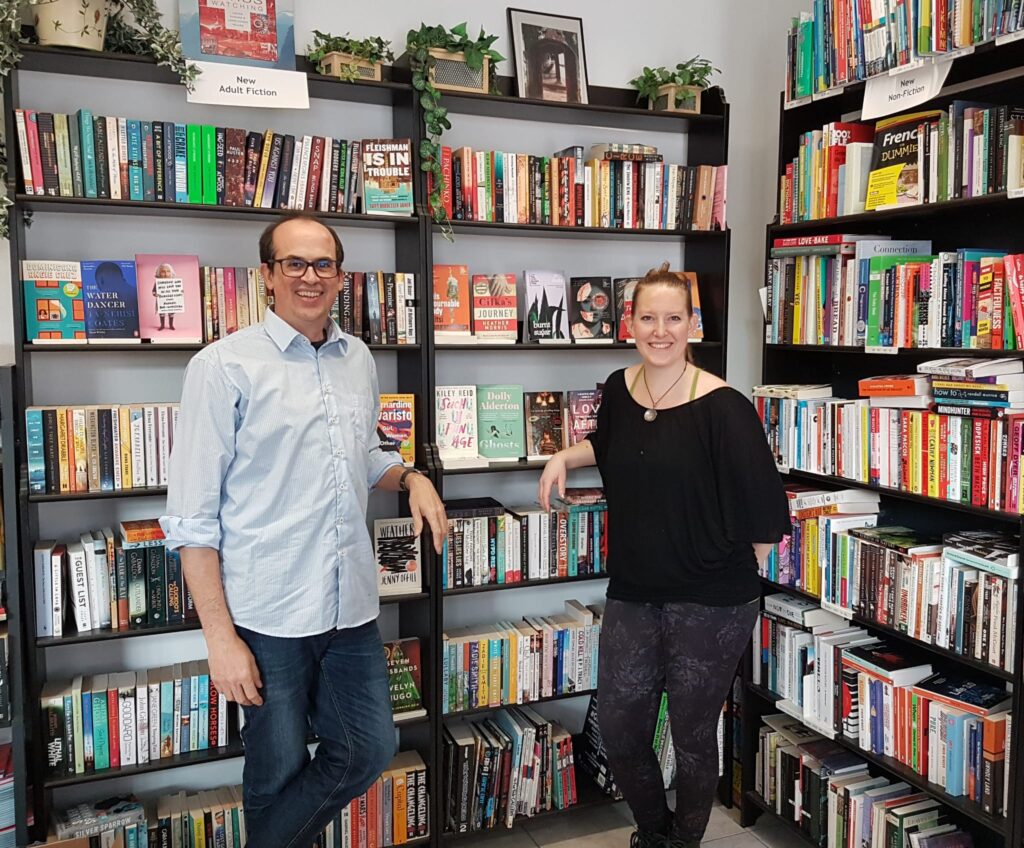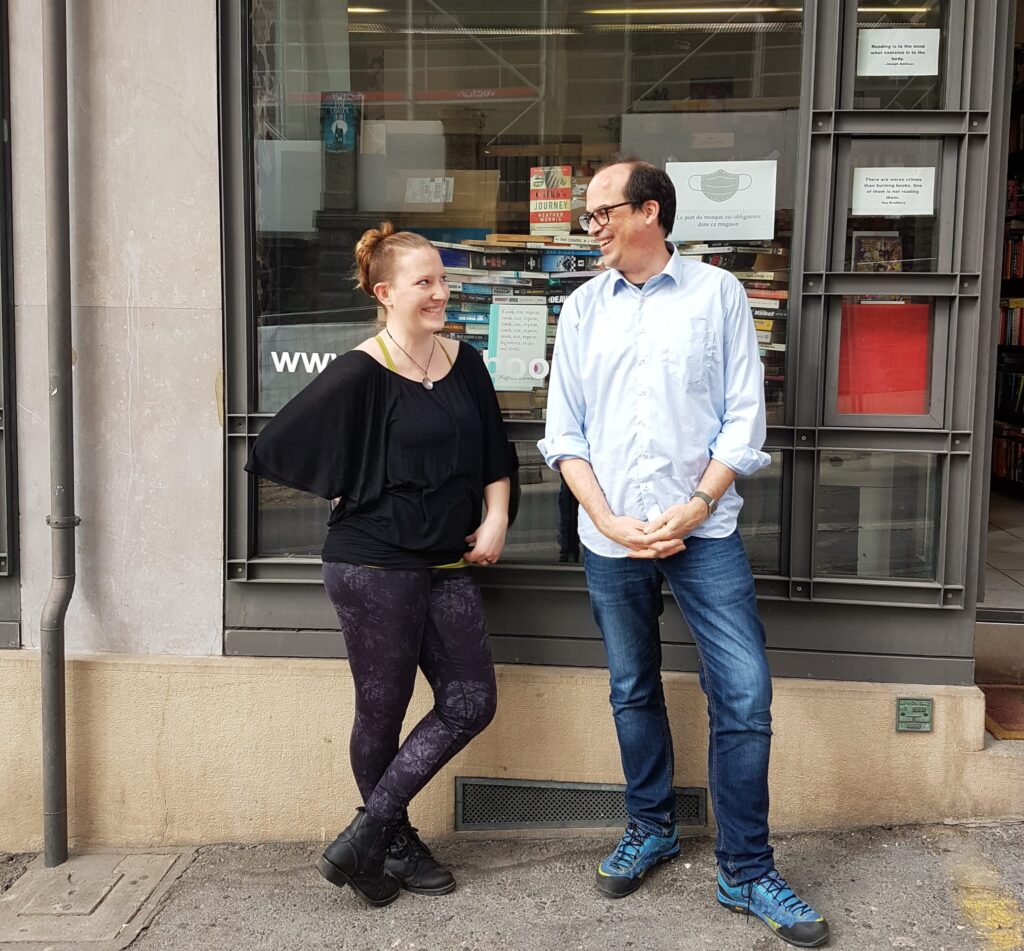
Matt Wake talks to Ruth McKee about all things books #worldbookday
by Ruth McKee
Like writing the novel you want to read if you can’t find it on the shelf, Matt Wake decided to start a book shop when he couldn’t find the title he wanted in any of the local outlets.
He had reached that point in life where he needed change; he wanted to move away from his job in marketing, and gravitate towards the things that made him tick: reading and writing.
It wasn’t just a romantic notion; opening a bookshop with titles in English made sense. Lausanne, a beautiful city near Lake Geneva in Switzerland, has two universities, many multinational corporations and sports associations, with tens of thousands of people who speak English. Often paying double the price for a novel in English, Matt realised there were ways around this; he could buy directly from the UK, rather than going through Swiss suppliers. So, in 2008, Books Books Books was born.
Books are at the heart of things in Switzerland, Matt says.
“The Swiss have a reverence for the book as a cultural object. There is even a Book Commisar in Lausanne who is responsible for promoting books, publishing, and bookshops. There are countless publishing companies in this area of Switzerland, publishing in French—as well as literary prizes for adults and children, and book festivals.”
One of the biggest literary festivals in the nearby town of Morges is Le Livre sur les Quais, where Matt has met and interviewed some of Ireland’s finest contemporary writers, including Anne Enright, Sara Baume, and Colum McCann. Irish writers in Switzerland include Clare O’Dea, author of The Naked Irish and The Naked Swiss, and Padraig Rooney, who wrote The Gilded Chalet, a journey through Switzerland’s literary history—which touches on James Joyce and his time spent in Zurich, his real-life backdrop to writing A Portrait of the Artist as a Young Man.
For his own life-story, Matt ended up in Switzerland partly because his former wife is Swiss-Canadian. He has Irish roots too—his mother is Irish, one of nine children—and his grandmother was born in County Tyrone. He says that he feels a cultural connection any time he visits Ireland; this must be true, because he is a natural story teller.
I asked him about what it’s like running a bookshop—since it’s not really like selling anything else; you’re peddling in people’s needs, dreams, secret pleasures, obsessions—you can tell something about them on quite an intimate level at the checkout desk.
“It’s never fun selling books like The Year of Magical Thinking knowing that the customer is dealing with bereavement, or packaging up books on depression,” Matt says. “I have loyal customers who tell me about their partners who have cancer, then there’s another who busks on the street and comes in with a handful of change to buy a book for his daughter.”
Matt runs the book shop with Rachel Bender, whom he says is an integral part of the shop. Sometimes being a book-seller can have a dash of social work; the pair don’t know who might come in, or what particular stories of their own customers might bring along with them. When anyone can walk through the door, no day is ever predictable.
“I had a vet in the other day who pointed to a bump on my forehead and told me about a drug I could use to diminish it. I looked the drug up— it’s only prescribed for horses and not in humans because it’s carcinogenic. Recently someone walked in and started shouting at me red-faced because someone had parked on the pavement (not my customer). I’ve had psychics offer to predict my future. Last week someone fell down outside my door and I spent half an hour patching him up and washing the blood away.”

The bookshop has been running for twelve years now, and in that time Matt has seen staff come and go—but they still drop in to see him.
“Many of my former employees have kids, doctorates, teaching jobs. That’s rather lovely, especially giving books to their children as presents…When my daughter was very ill, many of my customers donated to a 100 mile-bike ride I did (and continue to do so every year) for a childhood cancer charity. I find that very uplifting.”
Switzerland being the sort of place to attract the more salubrious customer too, Matt has had visits from a Middle Eastern princess (along with a body guard) and a close encounter with 007…
“The phone rang and a man with a sophisticated English accent asked me to order books for him. When I’d taken the order I asked for his name and he said, ‘Bond, James Bond.’ Well, no, actually, he didn’t, but it was Roger Moore on the other end of the line. He was staying in Lausanne for a few days. I was very impressed when he called back a few days later to make sure our invoice had been settled.”
Things haven’t always been easy. In the early days money was too tight to mention, with the only luxuries croissants and pain au chocolate on Sundays. Then there was the body blow of e-books a decade ago, which put many bookstores on the brink of bankruptcy. Enter stage right, and Covid-19 and Brexit have made quite the dancing partners.
Matt says that the pandemic has highlighted how much giants like Amazon make, but it’s also brought to the fore other places which are rivalling the big corporations, such as bookshop.org which aims to support local, but with an expanding network and database. As has been well-documented, bookshops have thrived under lockdown, and Books Books Books is no exception. However, the cat’s breakfast of Brexit is another matter.
“With Brexit, distribution has been a nightmare. Gardners, the biggest book wholesaler in the UK, couldn’t find a company to take shipments to Europe after Christmas. While Switzerland and the UK’s trading relationship remains unchanged, we have experienced lost and separated shipments. The foreign exchange market has also been in flux, so a lot of my time is spent on logistics.”
The talk of distribution, logistics and shipments made me wonder if it were true—as it is for so many of us— that old line from Wilde, about each of us killing the thing we love.
“Inevitably your relationship with books changes when you buy and sell them. They can become a source of frustration and stress—sometimes I reduce our most popular titles down to their ISBN numbers, which takes the romantic sheen off.”
But despite eating and drinking books for a living, Matt still fosters his passion for writing, and reading—albeit with more circumspection about what he reads; he has less patience now for books he doesn’t like. He’s recently finished Tokyo Ueno Station, by Yu Miri, is half way through reading The Body, by Bill Bryson with his daughter, and is reading Kim Jiyoung, Born 1982, by Cho Nam-Joo on the side.
Looking back to that first day when he opened Books Books Books one auspicious morning at nine o’clock all those years ago, Matt remembers two women coming in and buying what seemed like half the stock: “We hadn’t managed to put all the price stickers on when they walked in, I was rushing around looking up prices.” They were so enthusiastic, so excited to have an English language book shop in the area, that despite his trepidation he began to think his confidence might be well-founded. He wasn’t wrong.











